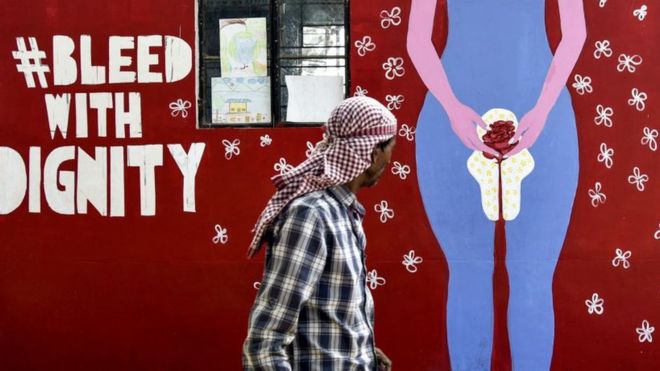Whenever we see stories about the “plight” of women in developing nations, it’s critically important to step back and ask whether the journalistic framing is rooted in condescending colonialism, painting a picture of a problem as affecting women in the Global South alone when in fact it spans cultures and nations. This is especially so when it comes to stories about menstruation, as we saw in critical responses to the Oscar-winning documentary film Period. End of Sentence.
A recent BBC story, however, reveals a troubling practice in India–one of many surrounding menstruation–that illuminates:
(1) the kinds of choices women must make when poverty and discrimination leave them few options, and
(2) possible wrongdoing by physicians who do not adequately inform women of the consequences of those choices.
That story, reported by Geeta Pandey in Delhi, asks “Why are menstruating women in India removing their wombs?“

A mural by artist Neelim Mahanta installed in Guwahati, India, on Menstrual Hygeine Day in 2019. For more, see NDTV.
According to Pandey, reports from Indian media in the Western state of Maharashtra reveal:
that thousands of young women have undergone surgical procedures to remove their wombs in the past three years. In a substantial number of cases they have done this so they can get work as sugarcane harvesters. Every year, tens of thousands of poor families from Beed, Osmanabad, Sangli and Solapur districts migrate to more affluent western districts of the state – known as “the sugar belt” – to work for six months as “cutters” in sugarcane fields. Once there, they are at the mercy of greedy contractors who use every opportunity to exploit them. To begin with, they are reluctant to hire women because cane-cutting is hard work and women may miss a day or two of work during their periods. If they do miss a day’s work, they have to pay a penalty.
…Because of the poor hygienic conditions, many women catch infections and, activists working in the region say, unscrupulous doctors encourage them to undergo unnecessary surgery even if they visit for a minor gynaecological problem which can be treated with medicine.
…My colleague Prajakta Dhulap from the BBC’s Marathi language service, who visited Vanjarwadi village in Beed district, says from October to March every year, 80% of villagers migrate to work in sugarcane fields. She reports that half of the women in the village have had hysterectomies – most are under the age of 40 and some are still in their 20s.
Dhulap reports that several women have developed disabling pain since the hysterectomies which has rendered them unable to work, even though it is to be able to work that they underwent the procedure.
Pandey goes on to discuss the claims of garment workers that, instead of being given a day off of work when they suffer from menstrual pain–menstrual leave is granted by some companies in India, by Bihar state in India, and in other nations to varying extents–say they were instead required to stay at work and given medications by their employers. The type of medication, side effects, risks, and benefits of the medication were not disclosed.
Pandey closes by noting that menstrual welfare measures, and indeed centralized government welfare measures generally, “rarely benefit those employed in India’s vast unorganised sector, which means that women like those working in Maharashtra’s sugarcane fields will remain at the mercy of their contractors.”

